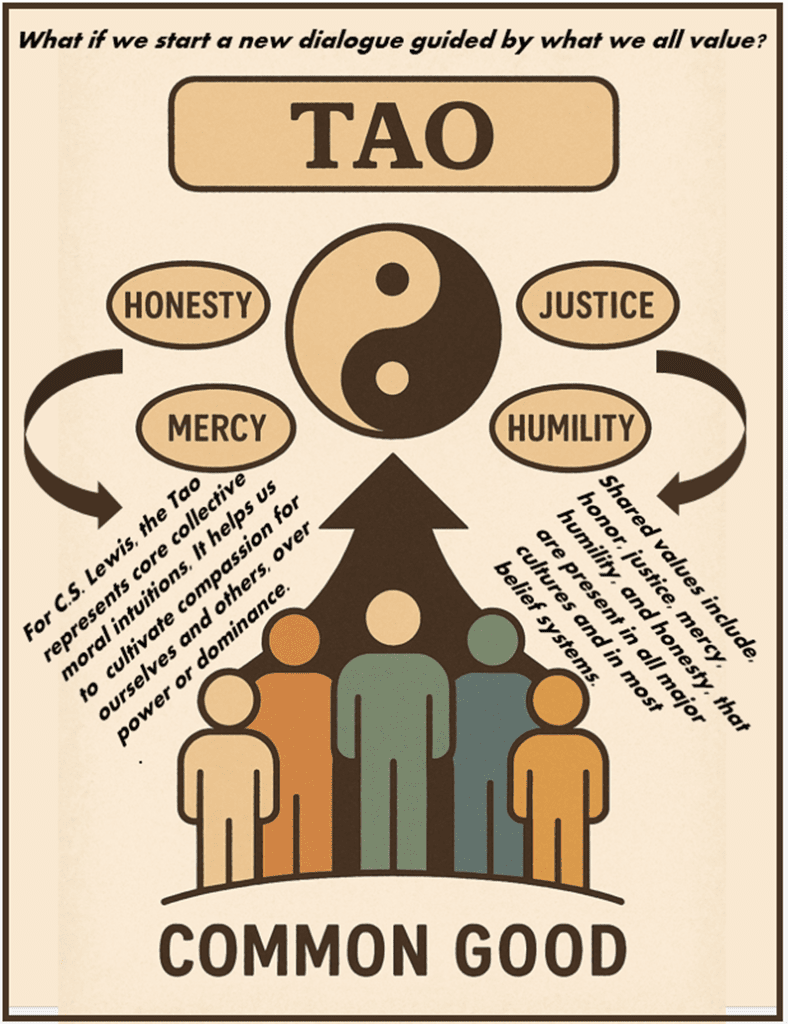
Tired of people shouting over one another, as organizations break and fall while our world sees us fail? C.S. Lewis’s idea of the Tao, especially as described in The Abolition of Man, offers profound insight into how we might unite and collaborate to resolve vital issues, and come together for the common good, even in controversial topics. His concept is not any one religious system, but rather a shared ethical law, or universal set of values, that transcends individual cultures and times. Could the Tao be the missing element that holds keys to help us better understand one another and relearn how to work well across differences?

Perhaps We Already Share More Than We Think
For Lewis, the Tao represents our core collective moral intuitions, honor, justice, mercy, humility, and honesty, that are present in all major cultures and belief systems.
Imagine the impact if we positioned the Tao at the helm of today’s polarized world, remembering our shared values (e.g., fairness, dignity, truthfulness) can be a bridge across divides. For instance, while we may disagree on policy, we often agree on protecting children, valuing truth, or caring for the vulnerable among us.
The Tao reminds us that common ground isn’t invented, it’s rediscovered, committed to and applied in practical, beneficial ways to all we do. It sustains dialogue among us in respectful ways as we collaborate best approaches to find our north start together in ways that guide us forward individually and collectively with similar standards that hold us accountable and ensure we communicate along the way. It’s opposite of what divides us today, because truth too often has lost its mooring, in favor of greed or power struggles.

Without a Shared Moral Compass, Dialogue Collapses
When we reject the Tao, we abandon objective values we share, and we’re left with pure subjectivity or manipulation. Have you seen it?
Let’s face it. Productive collaboration on tough issues, climate change, social justice, medical ethics, requires more than logic or opinion. It needs a shared sense of “oughtness” to show why we care. The Tao urges us to preserve a basic moral framework or we risk power and greed replacing principle and gratitude.
Collaboration thrives best when all parties agree which things are truly right and which are truly wrong. Respectful communication gets us to that understanding far faster, and in ways that benefit all.
Respect for the Tao Cultivates Humility
According to Lewis’ notion, the Tao ensures that no one person or culture owns the highest ethics. It humbles us by showing that we’re not the source of ultimate truth.
The Tao alters our approach to values and to one another, as it equips us to see a larger horizon, and to become part of a wider community. On controversial topics, humility makes space for listening. If we all accept that we are stewards of truth, not its creators, we can engage more respectfully, less defensively. It’s no longer “my truth vs. yours,” but it’s more about our shared quest to live justly, joyfully and humanely.
Communication within the Tao allows and even welcomes disagreement without dehumanization. We all learn from birth of more diverse possibilities we create together in ways that adhere to shared values. For instance, character counts!
The Tao Encourages Virtue Over Victory
According to Lewis’ teachings, the Tao emphasizes cultivating moral character, courage, honesty, and compassion for ourselves and others, over gaining power or dominance.
With the Tao as our shared pillar when discussing divisive issues, the goal is not to “win” the argument, but to grow in understanding and move toward the common good. This approach can guide everything from public debates to policy-making to family conversations.
We could say the Tao values right action more than being right.
The Tao Becomes a Unifying Ethical Language
Lewis illustrated how the Tao echoes in every tradition, from Confucius to Christianity to ancient Egyptian ethics, and so it can serve as a unifying moral language. How so?
In diverse societies, the Tao allows people of different faiths, ideologies, or philosophies to collaborate without erasing their valued distinctives. It invites us to look for resonances rather than conflicts in our values.
The Tao doesn’t erase differences, it weaves them into a shared human ethic.
In climate policy, the Tao unites us around stewardship and justice, not ideology.
In education, it teaches not just skills, but virtue, respect, courage, fairness.
In public discourse, the Tao helps us listen for what we already agree on, then build forward.
In leadership, it models integrity, humility, and long-term responsibility.
Closing Reflection:
C.S. Lewis didn’t offer the Tao as a perfect solution. It offers us a necessary new starting point, as illustrated here, though! Without shared values, we descend into manipulation or despair we see all around us when truth loses its footing. With the Tao, we may still disagree, but we do so with mutual respect and a commitment to something larger than ourselves.
“The effort to refute the Tao… is an effort to cut up the branch we are sitting on.” (C.S. Lewis, The Abolition of Man)
Getting the Tao Started



